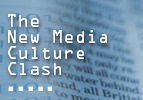



Thus far, I have focused on faculty responses. However, in addition to examining the new media composition opportunities offered, it is critical to hear directly from graduate students. During the semester in which my research was initiated, Old Dominion University offered a production-based course titled “Rhetoric in Cyberspace” that examined not only new media theory, but also required multiple digital compositions. Because of this requirement, students would be able to comment first-hand about creating new media. A request for volunteers was e-mailed to all 13 people registered for the course. Five indicated a willingness to be interviewed but scheduling conflicts allowed only three to participate (two doctoral students, one Masters student). Transcripts were completed for the two doctoral student interviews and will be analyzed here. Although it was not transcribed, the Masters student interview was used in compiling video components of this analysis.
The impetus for this empirical research was an experience with a final project in another PhD course, “Text and Technologies.” During the final meeting of that course, a colleague and I began to discuss our experiences surrounding the final assignment. While we had both initially decided to complete a new media project, she changed her mind during the composition process and decided to write a traditional 20 – 25 page paper instead. Thus, my colleague was asked and agreed to become the fourth student interviewed. Segments of that interview also are transcribed and included in this analysis. It is important to keep in mind the limitations associated with the analysis of this interview data.Meta-literacy & multimodal pedagogy • A focus on graduate students • Interview methodology • Works cited • Home